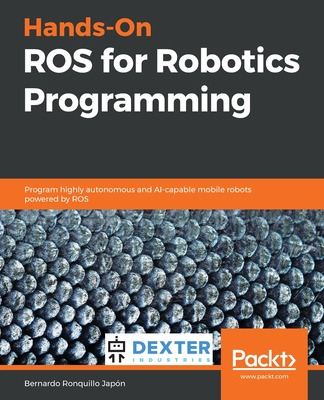Hands-On ROS for Robotics Programming
暫譯: 實作 ROS 機器人程式設計
Ronquillo Japón, Bernardo
- 出版商: Packt Publishing
- 出版日期: 2020-02-26
- 售價: $1,540
- 貴賓價: 9.5 折 $1,463
- 語言: 英文
- 頁數: 432
- 裝訂: Quality Paper - also called trade paper
- ISBN: 1838551301
- ISBN-13: 9781838551308
-
相關分類:
機器人製作 Robots
-
相關翻譯:
ROS 機器人編程實踐 (Hands-On ROS for Robotics Programming) (簡中版)
立即出貨 (庫存=1)
買這商品的人也買了...
-
 深入淺出 Python (Head First Python)
深入淺出 Python (Head First Python)$780$616 -
 HTML5 完美風暴, 2/e
HTML5 完美風暴, 2/e$1,000$700 -
 ROS Robotics By Example
ROS Robotics By Example$2,060$1,957 -
 $774Xilinx FPGA 權威設計指南:基於 Vivado 2018 集成開發環境
$774Xilinx FPGA 權威設計指南:基於 Vivado 2018 集成開發環境 -
 VMware vSphere 6.7 私有雲建置實戰
VMware vSphere 6.7 私有雲建置實戰$520$390 -
 機器學習工程師面試全破解:嚴選124道AI演算法決勝題完整剖析
機器學習工程師面試全破解:嚴選124道AI演算法決勝題完整剖析$650$507 -
 ROS 機器人編程與 SLAM 算法解析指南
ROS 機器人編程與 SLAM 算法解析指南$414$393 -
 $1,788Deep Reinforcement Learning Hands-On, 2/e (Paperback)
$1,788Deep Reinforcement Learning Hands-On, 2/e (Paperback) -
 PyTorch Computer Vision Cookbook
PyTorch Computer Vision Cookbook$1,750$1,663 -
 生成深度學習|訓練機器繪畫、作曲、寫作與玩遊戲 (Generative Deep Learning)
生成深度學習|訓練機器繪畫、作曲、寫作與玩遊戲 (Generative Deep Learning)$580$458 -
 Kubernetes 建置與執行 : 邁向基礎設施的未來, 2/e (Kubernetes: Up and Running: Dive into the Future of Infrastructure, 2/e)
Kubernetes 建置與執行 : 邁向基礎設施的未來, 2/e (Kubernetes: Up and Running: Dive into the Future of Infrastructure, 2/e)$520$411 -
 現在學正是時候:用 Docker + Kubernetes 建立永續叢集服務
現在學正是時候:用 Docker + Kubernetes 建立永續叢集服務$780$616 -
 Kubernetes 最佳實務 : 成功部署應用程式的藍圖 (Kubernetes Best Practices: Blueprints for Building Successful Applications on Kubernetes)
Kubernetes 最佳實務 : 成功部署應用程式的藍圖 (Kubernetes Best Practices: Blueprints for Building Successful Applications on Kubernetes)$520$411 -
 $594Kali Linux 高級滲透測試, 3/e (Mastering Kali Linux for Advanced Penetration Testing: Secure your network with Kali Linux 2019.1 – the ultimate white hat hackers' toolkit, 3/e)
$594Kali Linux 高級滲透測試, 3/e (Mastering Kali Linux for Advanced Penetration Testing: Secure your network with Kali Linux 2019.1 – the ultimate white hat hackers' toolkit, 3/e) -
 GAN 對抗式生成網路 (GANs in Action: Deep learning with Generative Adversarial Networks)
GAN 對抗式生成網路 (GANs in Action: Deep learning with Generative Adversarial Networks)$750$638 -
 $469ROS 機器人項目開發 11例, 2/e (ROS Robotics Projects, 2/e)
$469ROS 機器人項目開發 11例, 2/e (ROS Robotics Projects, 2/e) -
 深度強化式學習 (Deep Reinforcement Learning in Action)
深度強化式學習 (Deep Reinforcement Learning in Action)$1,000$790 -
 $422Kali Linux 2 網絡滲透測試實踐指南, 2/e
$422Kali Linux 2 網絡滲透測試實踐指南, 2/e -
 $604聯邦學習技術及實戰
$604聯邦學習技術及實戰 -
 ROS2 源代碼分析與工程應用
ROS2 源代碼分析與工程應用$252$239 -
 Deep Reinforcement Learning with Python: With Pytorch, Tensorflow and Openai Gym
Deep Reinforcement Learning with Python: With Pytorch, Tensorflow and Openai Gym$2,060$1,957 -
 實戰 ROS 機器人作業系統與專案實作, 2/e (ROS Robotics Projects, 2/e)
實戰 ROS 機器人作業系統與專案實作, 2/e (ROS Robotics Projects, 2/e)$580$435 -
 $594嚴肅的密碼學:實用現代加密術
$594嚴肅的密碼學:實用現代加密術 -
 $2,115Mastering ROS for Robotics Programming : Best practices and troubleshooting solutions when working with ROS, 3/e (Paperback)
$2,115Mastering ROS for Robotics Programming : Best practices and troubleshooting solutions when working with ROS, 3/e (Paperback) -
 結合 Matlab 與 ROS 快速上手無人自走車
結合 Matlab 與 ROS 快速上手無人自走車$700$553
商品描述
Connecting a physical robot to a robot simulation using the Robot Operating System (ROS) infrastructure is one of the most common challenges faced by ROS engineers. With this book, you'll learn how to simulate a robot in a virtual environment and achieve desired behavior in equivalent real-world scenarios.
This book starts with an introduction to GoPiGo3 and the sensors and actuators with which it is equipped. You'll then work with GoPiGo3's digital twin by creating a 3D model from scratch and running a simulation in ROS using Gazebo. Next, the book will show you how to use GoPiGo3 to build and run an autonomous mobile robot that is aware of its surroundings. Finally, you'll find out how a robot can learn tasks that have not been programmed in the code but are acquired by observing its environment. You'll even cover topics such as deep learning and reinforcement learning.
By the end of this robot programming book, you'll be well-versed with the basics of building specific-purpose applications in robotics and developing highly intelligent autonomous robots from scratch.
商品描述(中文翻譯)
將實體機器人連接到使用機器人作業系統(Robot Operating System, ROS)基礎架構的機器人模擬,是ROS工程師面臨的最常見挑戰之一。通過本書,您將學習如何在虛擬環境中模擬機器人,並在相應的現實世界場景中實現所需的行為。
本書首先介紹GoPiGo3及其配備的感測器和執行器。接著,您將通過從零開始創建3D模型,並使用Gazebo在ROS中運行模擬,來操作GoPiGo3的數位雙胞胎。然後,本書將向您展示如何使用GoPiGo3構建和運行一個能夠感知周圍環境的自主移動機器人。最後,您將了解機器人如何學習未在程式碼中編寫的任務,而是通過觀察其環境來獲得這些任務。您甚至會涵蓋深度學習和強化學習等主題。
在本書結束時,您將熟悉機器人應用程式開發的基本知識,並能夠從零開始開發高度智能的自主機器人。
作者簡介
Bernardo Ronquillo Japón is an Internet of Things (IoT) and robotics expert who has worked for top technology companies since 1995, including Instituto de Astrofísica de Canarias, Gran Telescopio Canarias, Altran, and Alestis Aerospace. Using his skills and experience, he founded The Robot Academy, where he develops open source hardware and software solutions for engineers and makers: Social Robot IO (2015), for the stimulation of children with autistic spectrum disorder; Robot JUS (2016), which helps engineers get deeper technical insights with the Robot Operating System (ROS) when using low-complexity hardware; and IIoT All-in-One (2018) as an industrial IoT training package for assisting companies in their digital transformation process.
作者簡介(中文翻譯)
伯納多·隆基約·哈朋(Bernardo Ronquillo Japón)是一位物聯網(IoT)和機器人專家,自1995年以來一直在頂尖科技公司工作,包括加那利天文物理研究所(Instituto de Astrofísica de Canarias)、大加那利望遠鏡(Gran Telescopio Canarias)、阿爾特朗(Altran)和阿萊斯蒂斯航空(Alestis Aerospace)。憑藉他的技能和經驗,他創立了機器人學院(The Robot Academy),在那裡他為工程師和創客開發開源硬體和軟體解決方案:社交機器人IO(Social Robot IO,2015年),用於刺激自閉症譜系障礙兒童的發展;機器人JUS(Robot JUS,2016年),幫助工程師在使用低複雜度硬體時,深入了解機器人操作系統(Robot Operating System,ROS)的技術;以及工業物聯網全能包(IIoT All-in-One,2018年),作為協助企業數位轉型過程的工業物聯網訓練套件。
目錄大綱
- Assembling the Robot
- Unit testing of GoPiGo3
- Getting started with ROS
- Creating the virtual two wheeled ROS robot
- Simulating the robot behavior in a virtual environment with Gazebo
- Programming in ROS: Commands and tools
- Robot control and simulation
- Virtual SLAM and navigation using Gazebo
- SLAM for robot navigation
- Applying Machine Learning in Robotics
- Machine Learning with OpenAI Gym on ROS
- Achieve a goal through Reinforcement Learning
目錄大綱(中文翻譯)
- Assembling the Robot
- Unit testing of GoPiGo3
- Getting started with ROS
- Creating the virtual two wheeled ROS robot
- Simulating the robot behavior in a virtual environment with Gazebo
- Programming in ROS: Commands and tools
- Robot control and simulation
- Virtual SLAM and navigation using Gazebo
- SLAM for robot navigation
- Applying Machine Learning in Robotics
- Machine Learning with OpenAI Gym on ROS
- Achieve a goal through Reinforcement Learning








